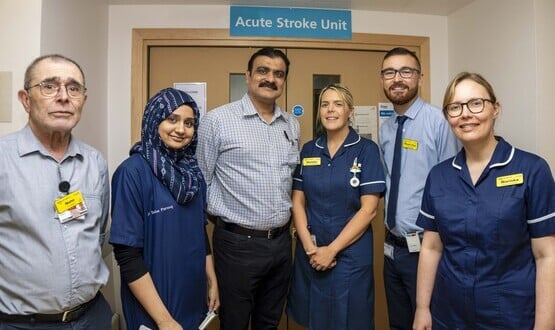Unwinding the cord
- 27 June 2006
 Fiona Barr
Fiona Barr
Last month brought both highs and lows for NHS Direct. On the one hand the service launched a three month consultation on the closure of 12 call centres with the prospect of hundreds of job losses for staff. On the other hand in May the eight-year-old health information service recorded its busiest month ever.
It is the online service that is growing at the fastest rate, with visits doubling over the last 18 months, and the telephone service which is the focus of the current cutbacks. Although visits to the call centres have grown by 2-3% in the last year, the company is proposing to close 12 locations over the next 18 months. This will result in a loss of jobs on those sites and the merging of staff on a smaller number of centres.
Key factors in the cutbacks have been the organisation’s failure to win as many out-of-hours contracts as expected, mainly as a result of cost, and slower than expected uptake on the Choose and Book Appointments Line which it has been contracted to run by the Department of Health.
Variety of services
|
"Patients said they wanted better information about their health, better access to the health service and better coordination of those services. We are really well placed to provide all those things" — Dr Mike Sadler, medical director and chief operating officer
|
Dr Mike Sadler, medical director and chief operating officer for NHS Direct, sees the restructuring as a sensible response by an organisation that had grown from an initial 22 pilot sites all operating individually to a single national organisation which works out of more than 50 locations around England.
He says: “We’re trying to make ourselves as best value for money as we can and it makes sense to try and consolidate our estate where the cost per unit is quite high.”
He also believes the changes will help NHS Direct to cement the position he believes it has as “the expert, effective provider of 24-hour health care information.”
It is a base from which NHS Direct has ambitions to offer a variety of services including pre-operative and post-operative care, remote monitoring of patients with long term conditions and more sophisticated booking options for patients use Choose and Book.
Dr Sadler adds: “In the consultation ahead of this year’s white paper patients said they wanted better information about their health, better access to the health service and better coordination of those services. We are really well placed to provide all those things.”
Remote monitoring of patients with long term conditions is a big area for NHS Direct. It hopes to harness techniques used in the US to improve care of patients with chronic diseases.
A flagship project for this kind of work is the Birmingham OwnHealth scheme, set up in April this year in conjunction with UK Pfizer Solutions and Birmingham and the Black Country Strategic Health Authority, which aims to provide an ‘assertive care management programme’ for up to 2000 patients with long term conditions.
The initiative, modelled on a system that been running in Florida for five years, offers enrolled patients a programme of telephone-based consultations with one of 12 ‘care managers’ who are nurses employed by NHS Direct in the hope that it might ultimately reduce hospital admission rates and deliver improvements in morbidity.
Dr Sadler says that about 900 patients have been enrolled so far. He adds: “Although it’s too early to say anything definite we already have a wealth of stories that we are now engaging with patients who have slightly struggled with the health service before.”
Dr Sadler says several PCTs in other areas have shown interest in the scheme with some "fairly solid names” for the next few areas that might set up similar schemes but nothing to announce as yet.
White paper
NHS Direct will also have a role in the demonstrator projects proposed in the white paper on care outside hospital which aim to see how assistive technology can be developed to keep patients out of hospital and in the community.
The DH pledged to work with Connecting for Health and NHS Direct to develop the project and Dr Sadler says NHS Direct is now waiting for the imminent publication of the project bid criteria. The original timetable in the white paper was for the project to begin by the end of 2006 and report on early findings is due by the end of 2008.
A key aspect of the demonstrator projects is to improve links between health and social care and DrSadler predicts that NHS Direct will be working much more closely with social services in future.
A proposal in NHS Direct’s white paper submission was that the service could set up an online social care wiki to allow patients to learn from one another about coping with ill ness and where to obtain support and services.
Dr Sadler says this was something of his own creation on and although he still would love to see it there are no immediate plans to get it off the ground. In the mean time, however, NHS Direct Online is to add a lot of social care content to its website as well as expanding content on healthy living and lifestyles.
He points out that, well ahead of the NHS Care Records Service, NHS Direct already has six million electronic patient records, held on the single national database that the service now uses, and therefore is in an ideal position to help provide coordinated care.
Healthspace
|
"We see the potential for using Healthspace to add benefits to patients, particularly those with long term conditions, when it is more actively used" — Dr Mike Sadler
|
Although no longer responsible for Healthspace, the NHS website which is ultimately expected to include NHS Care Records Service summary record information for patients, Dr Sadler says that he could see a number of ideas for the project including adding personalised information about conditions and treatment options for patients using Healthspace. Dr Sadler added: "We see the potential for using Healthspace to add benefits to patients, particularly those with long term conditions, when it is more actively used."
Other proposals in the white paper submission include proposals to offer an extended Choose and Book service, including providing more information about accessing local providers and the procedure a booking might have been made for, plus carrying out pre and post-operative assessments by telephone, cutting outpatient waiting times.
At the moment around 85-90% of funding comes direct from the DH but, as well as hospitals and primary care trusts, future potential customers could be practice-based commissioning groups.
Here NHS Direct faces an ongoing challenge to win the hearts and minds of the medical profession – not quite on the Connecting for Health scale, but still sizeable enough.
“The perceptions of clinicians in the health service are not that favourable,’ acknowledges Dr Sadler who cites a number for historical reasons why be believes GPs are less than thrilled with NHS Direct.
Perhaps the two most common objections to NHS Direct are that too many patients are referred back to their GP and that NHS Direct is simply creating demand for a new service rather than dealing with care that would otherwise have gone elsewhere.
However this is a charge Dr Sadler refutes. He says: “When I was a GP and someone was anxious about their health in the middle of the night patients had three choices – call out their GP, go to accident and emergency or call an ambulance. There was no other recourse that enabled them to speak to a professional who could deal with the problem.”
Dr Sadler argues that the availability of health information is often underplayed when the current topics of self care and health promotion are discussed.
He adds: “At a cost of less than £2.50 per head per year for 24 hours access to health information services via telephone, the internet and digital TV I think that’s pretty good value for money when I think about what it costs you to get insurance for a plumber.”




